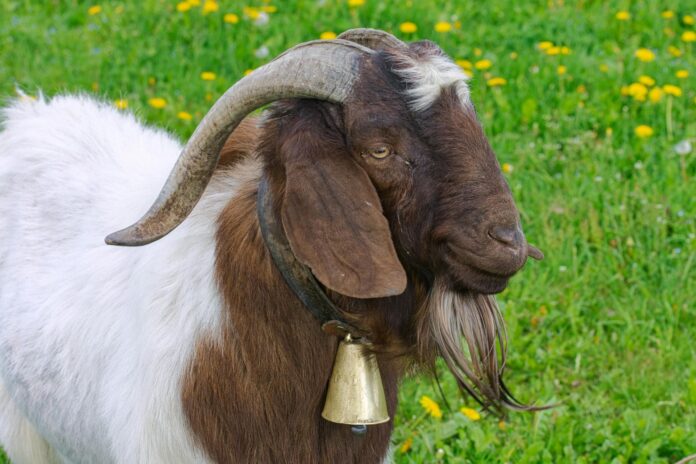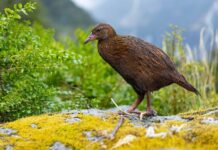We have discussed many large animal species so far, but large goat breeds are not here yet. So I think it is time I search for them to put together this list for you today. We are going to talk about 10 large goat breeds on the list, and you probably know some of them. Let’s see which one is the largest goat species in the world, check them out.
10Rove Goat
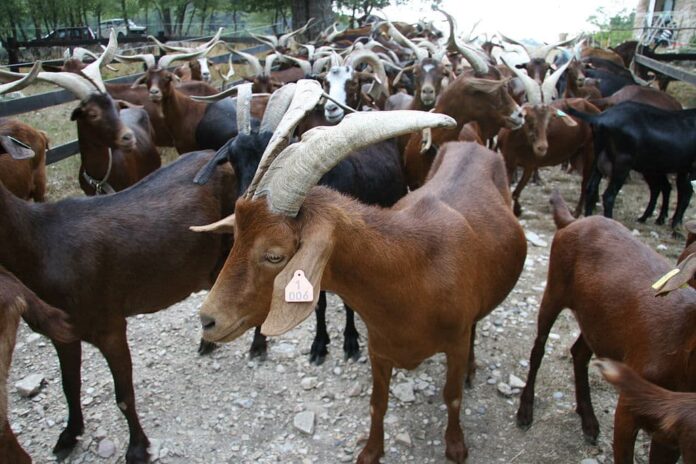
Weight: 110 – 132 pounds
First domesticated in France, this goat breed is from Le Rove which is a small village near Marseille. A Rove goat has long twisted horns which is one of the distinctive appearances that this breed possesses. The horns are the shape of a lyre, and the horns of an adult Rove goat can grow as long as 4 feet. Along with the horns, they have a smooth coat covering their bodies as well as short and thick hair. The color of the coat is often black or red, but a mix of other colors is also common. Rove goats are so active and acrobatic, and they are also friendly and well-behaved. They could be too large to have around children, but these goats are nice and kind.
Generally, these goats are very hardy and strong which is suitable for arid climates. Farmers can raise them in inaccessible areas since they can seek out landscapes with poor or scarce vegetation. So they are used for clearing out areas or landscapes to counteract fires that those places are prone to. Keeping those landscapes clear can stop fires, and that is one of the benefits that these goats offer. Rove goats are not the best at producing milk which is why this type is better to raise for meat. While the quantity of milk production is lower, the quality of their milk is amazing. Rove goat milk is creamier and thicker than other goat breeds, making them useful to have still.
9Beetal Goat
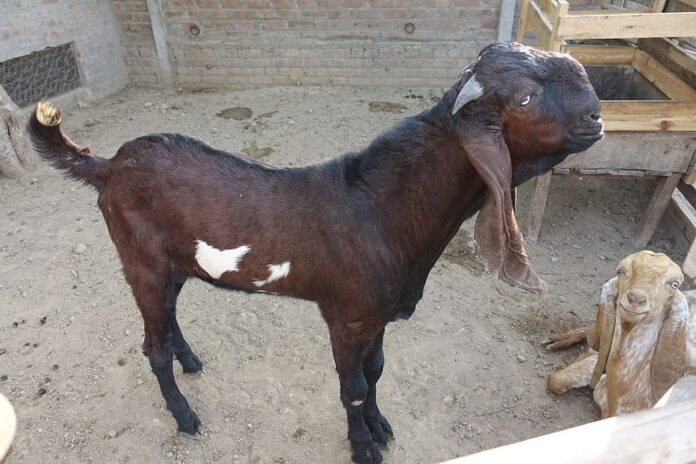
Weight: 110 – 143 pounds
With a large head and a broad Roman nose, Beetal goats are quite handsome among other breeds. This large goat breed has long legs and long pendulous ears, and both males and females have horns that curve backward. Despite being big and long, Beetal goats are still slightly smaller than Jamunapari goats. There are different colors of this breed, but the main body color is golden brown or red with white spots.
Coming from Punjab and Haryana, Beetal goats are the breeds people raise for dairy and meat production. On average, a Beetal goat can produce from 2.5 to 4 liters of milk daily. The fascinating thing about these goats is that their curious nature allows them to eat a wide range of food. From bitter and salty to sour and sweet, Beetal goats can handle them all. This is why they are among the popular goat breeds because they don’t require a grazing place to live. On top of that, these goats can also adapt to live in any climate and environment as well.
8Saanen Goat
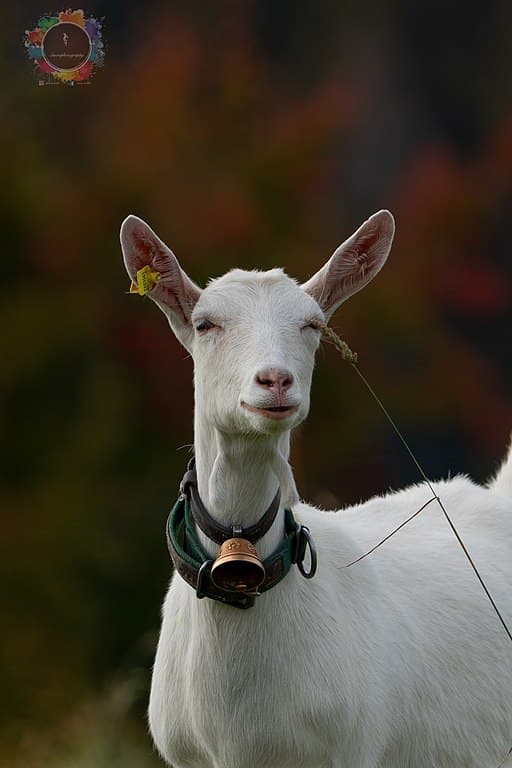
Weight: 135 – 160 pounds
Being among large goat breeds is one thing, but being so hardy and strong is another incredible trait of these goats. Originally coming from the Swiss valley, Saanen (pronounce Saw-Nen) can live in cold climates without a problem. On top of their sturdiness, these goats are also friendly which makes them amazing to have on the farms or ranchers. By being friendly, Saanen goats get along well with pretty much everyone from other goats to farmyard animals and humans. With proper care, they may even form a bond with the owners which is so sweet. In case there are no packs of goats, they will gladly adopt other animals are members of their group.
Saanen goats are highly capable pack goats that are famous for their milk production. A single Saanen goat can produce around 2 gallons of milk per day, but 3 gallons are also possible. In fact, they are the largest dairy goat breed in the world. The main purpose of these goats is milk production, but they are also popular pets due to their nature. Not to mention that they are very hardy and strong, these goats can live anymore. Feet tough and leggy, walking on tough terrain is not a problem for them. Plus with being resistant to diseases, Saanen goats are incredible.
7Damascus Goat
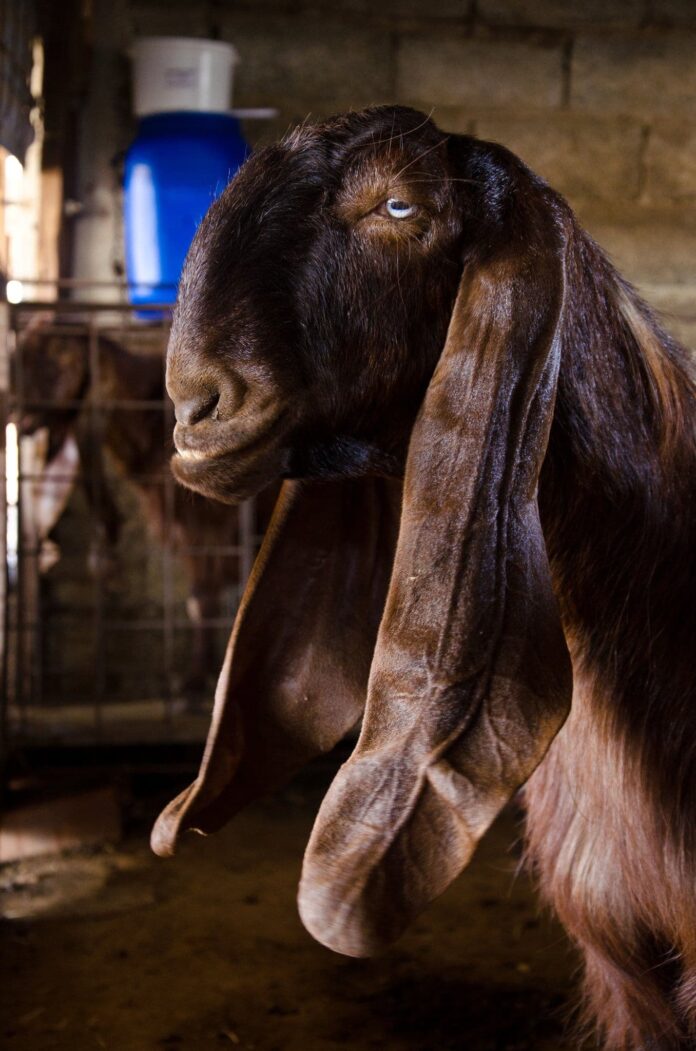
Weight: 132 – 198 pounds
With an extremely unique appearance, you can never mistake Damascus goats for any other species. A Damascus goat has long ears with an outward twist hanging from its relatively small head in front of its chest. These goats are usually brown or red, but gray or pied ones are also common. The coat or hair is long, and a fully grown Damascus goat has a long neck and long legs. As a baby or young goat, it looks very adorable but the appearance changes completely when it becomes adults. This is also how a Damascus goat has another nickname “The Monster” goat.
Goes by many names like Baladi, Shami, and more, Damascus goats are a native breed from Syria and other Middle East countries. It is a breed that went through genetic selection for meat and milk due to its high quality. In some areas, people also use their fine leather and hair on top of the meat and milk. If a Damascus goat receives proper feed and care, she can deliver large milk quantities that are rich in fat and protein daily. The incredible thing about this large goat species is that it can deliver from 3 to 4 babies each time. Not to mention the good behavior and calm temperament, Damascus goats are one of the best species to have.
6Jamunapari Goat

Weight: 143 – 198 pounds
A Jamunapari goat is a Roman nose lining with its parrot mouth, and the ears are very long and flat. The colors of these goats range from black, brown, white, and yellow to various mixed colors. Both males and females of this breed have a pair of small horns that curve backward. Jamunapari goats have very long bodies and legs for goats, and the males are larger than the females in size. The mother usually gives birth to one baby a year, but twins and triplets are also common. These goats spend the majority of their time browsing in both summer and winter, but are more active in cold climates.
Farmers raise Jamunapari goats for their meat and milk, but this breed is more popular as dairy goats. On average, a female Jamunapari can deliver between 1.5 to 2.5 liters of milk per day which is a lot. The milk of these goats is both healthy and tasty, containing around 5% to 6% of fat. With everything combined, Jamunapari goats are very suitable for commercial dairy goat farming business. This is also the reason why these goats are the best dairy goat in India, where they originated from.
5Alpine Goat

Weight: 176 – 220 pounds
Here you are looking at the most common type of goat that is used for cheese, milk, and other dairy products. You will see this large goat breed on farms and ranches throughout the Western parts, especially the mountainous French countryside. This large goat breed thrives in cold mountainous climates, but you can have them in warmer areas inside air-conditioned barns. Alpine goats are friendly, long-lived, and sweet, making them perfect to have as domestic farm animals. Another interesting fact about them is that these goats come in a wide variety of colors depending on the breeds. For example, the Pied breed is spotted goats with various markings. You can easily distinguish between female and male Alpine goats by the beards on their chins. Male Alpine goats have beards, the females do have beards but quite rare to see.
As I have mentioned above, Alpine goats are kept for their milk to make dairy products such as butter, cheese, milk, and more. With a large build, these goats can also pump out the milk more without suffering a loss in body condition. Some strong females can provide up to a gallon of fresh milk each day which is amazing. The milk from Alpine goats has a strong flavor, and is way richer than cow’s milk. The origin habitats of these goats are rocky mountaintops of the French countryside, but they are domestic livestock for quite some time. Their favorite environments to live in are cool and cold which resemble the natural habitats they originated from. At the same time, they also do incredibly well when it comes to adapting to hot and humid weather.
4Angora Goat

Weight: 180 – 225 pounds
Looking so much like sheep, this is actually an Angora goat that is not even a close relative. The body of an Angora goat has even hair covering it, except for below the knees. A healthy Angora goat has soft hair that falls in soft ringlets which is quite beautiful to look at. The unique hair is the reason that makes these goats look like sheep. Both the males and females have tannish-brown horns of spiral shape that point backward towards their bodies. The horns are at least 2 inches apart from one another, and they can grow up to 24 inches long. This large goat breed is very docile, friendly, and curious, and they always try to see things around them.
The hair on an Angora goat grows around an inch per month, giving this wooly appearance. In fact, this is the only goat breed in the world that produces hair. Their color can be black, brown, gray, red, white, and even silver. On the farm, these goats are shaved twice each year for fiber collection. Ideally, the owners shave these goats when their fibers are around 4.7 inches to 5.9 inches long. Adult Angora goats also produce around 10.6 lbs of mohair annually. Mohair can be turned into many different things such as coats, furnishings, scarves, socks, and more. The only downside of those pretty hair is that they are susceptible to external parasites that other goats have.
3Kiko Goat

Weight: 125 – 275 pounds
Kiko goat is a new breed from New Zealand with magnificent traits that farmers and ranchers are fond of. Back in the 1980s, goat farmers Garrick and Anne Batten crossed feral goats with a variety of dairy goats. Now we have Kiko goats, a large goat breed with a sturdy build. Most Kiko goats come with cream or white coloration but the ones with darker color is also common. A Kiko goat has a stout body with muscles, and they have long ears that are often erect but also droop down. The males have long horns but they do not use those horns to attack or harm people at all. Kiko goats are quite popular among farmers due to their ability to grow and survive even under harsh conditions.
The main purpose of raising this large goat breed is for their meat because they are fast-growing and hardy. Personality-wise, Kiko goats are docile and friendly which makes them good pets to have around. The best part is that these goats are fearless so they do not back down easily with predators. More than that, Kiko goats are very easy to care for along with long and productive lives. Even better, these goats are also extremely parasite resistant which is a total plus. Because they don’t have thick coats or hair like some other breeds, Kiko goats thrive in warm and wet climates. However, they have dense coats that will grow long in cold weather.
2Anglo Nubian Goat
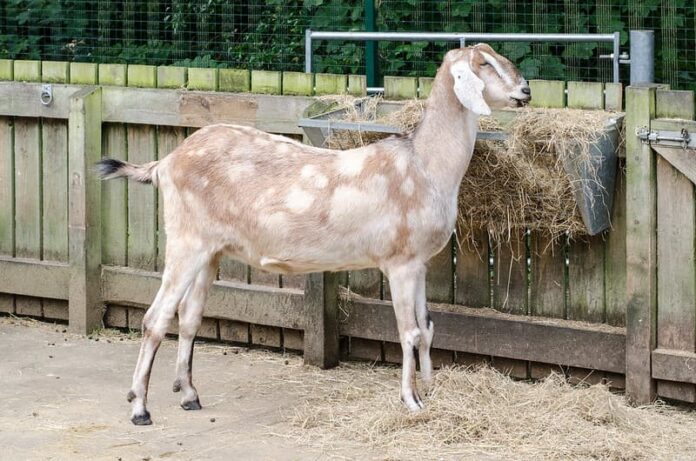
Weight: 240 – 310 pounds
An Anglo-Nubian goat is one attractive grazer with a combination of black, red, tan, and white fur. As one of the largest goats, this species also has a hardy and strong build as well. This is why they are also able to pull carts and saddle heavy weights for farmers. Despite being large and tough, they are actually curious, docile, and friendly animals to be around. In fact, these friendliest goats are highly sociable with the nice characteristic of wanting human interaction like petting and stroking. Hence, Anglo-Nubian goats are also popular as pets apart from being production animals.
Originally, this goat breed was primarily raised for milk and it is still are for the same purpose today. Milk from Anglo-Nubian goats has a sweet and unique flavor, making it popular for various purposes. The tasty milk from this large goat has one of the highest concentrations of butterfat which is ideal for cheesemaking. Additionally, Anglo-Nubian goats are also famous for their high-quality fat content and meat production. One of the reasons that makes them popular is the meat and milk products that exceed general standards. The fascinating thing about this goat breed is that it travels so far from its original country, England. People can conveniently import them as livestock due to their produces and their adaptability to different climates.
1Boer Goat
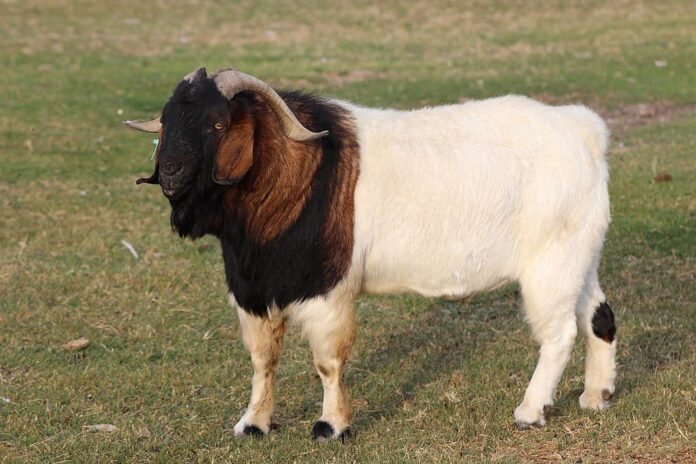
Weight: 240 – 300 pounds
You can easily tell a Boer goat by its red head, some red portions on its neck, and its white body. A Boer goat has short, smooth, and glossy hair along with large pendulous ears that hang down in a droopy manner. Along with that, the males also have thick horns on their heads that curve backward. Some of the special traits of Boer goats are their docility, fast growth, and high fertility which make them stand out. Plus with the females’ superior mothering skills, no doubt why this species is among the best.
Just like most large goat breeds on our list today, this one is also adaptive to various climates and terrain environments. While some goat breeds are common for different parts, Boer goats are only popular for their meat production. Because of their fast growth, this large goat species is always in high demand since they produce desirable carcasses. Apart from the meat, Boer goats are also popular as companion animals due to their calm and docile nature. This is why some farms have Boer goats around for kids to feed or play with.
Related Post: Largest Sheep Around The World

